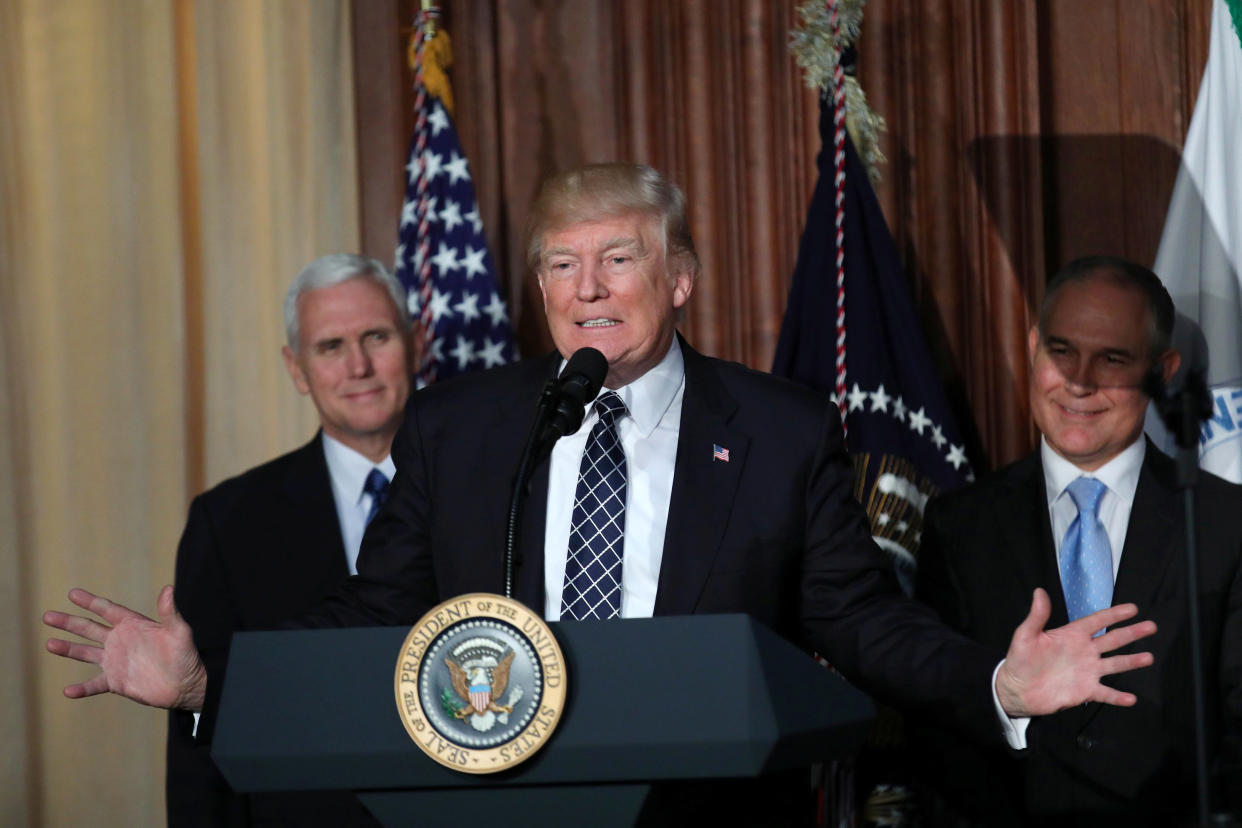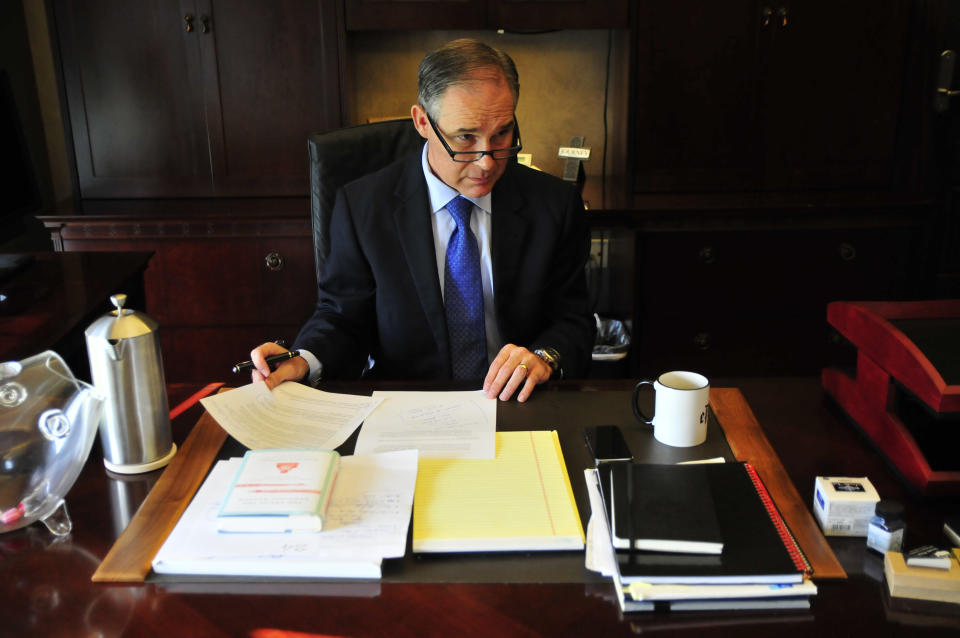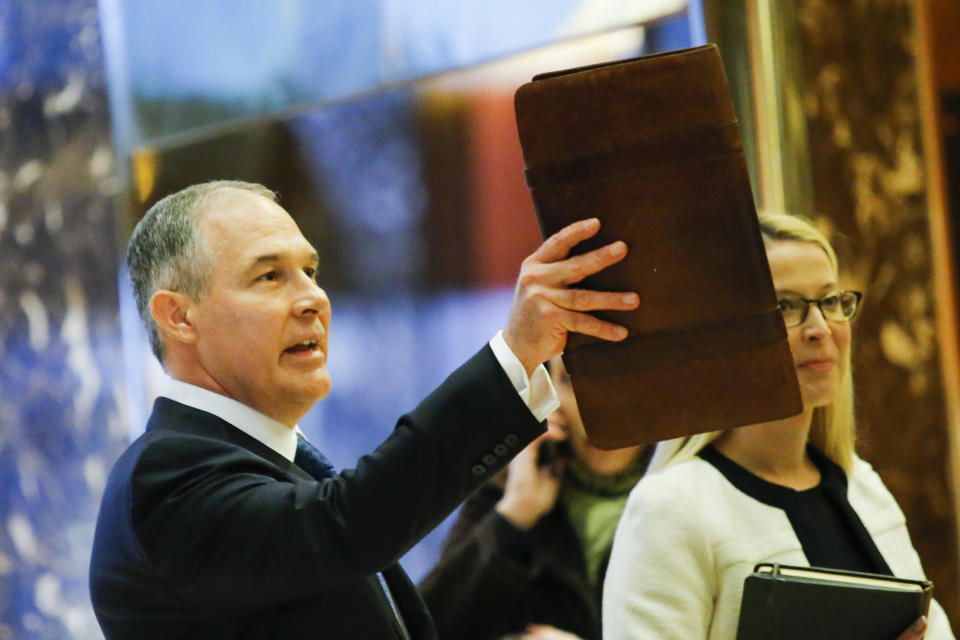Trump's Latest Budget Still Takes An Ax To Environmental Protection Agency

WASHINGTON ― The latest version of the Trump administration’s 2018 budget will still cut the budget for the Environmental Protection Agency by nearly one-third.
The budget proposed on Tuesday would cut funding to the agency to $5.65 billion ― a 31.4 percent reduction.
As far as the EPA goes, the proposal doesn’t appear to have changed drastically from the so-called “skinny budget” released in March.
Science and health advocates decried the cuts. The proposal “takes a wrecking ball to agencies that protect our health, safety and environment,” said Ken Kimmell, president of the Union of Concerned Scientists and former Massachusetts Department of Environmental Protection commissioner, in a statement. The lower budget would mean “taking our environmental cops off the beat and allowing those who would seek to pollute to get away with it.”
The budget proposes eliminating funding to every program to deal with global warming, including the Clean Power Plan, the first federal policy to put limits on carbon dioxide pollution from the utility sector, by far the biggest emitter of greenhouse gases.
“Clearly this is about declaring war on [the fight against] climate change,” said Elgie Holstein, a senior director at the non profit advocacy group the Environmental Defense Fund. “It’s not a particular surprise, though it’s deeply disappointing.”
In March, Trump signed an executive order instructing EPA Administrator Scott Pruitt to review the Clean Power Plan, which had already been stayed by the Supreme Court. Despite this, the EPA is legally required to regulate carbon dioxide emissions under a separate 2007 Supreme Court decision, which found that the public health risk posed by greenhouse gases means the agency should take some action.
Low-income people and communities of color, who disproportionately live in high-pollution areas, will bear the brunt of the cuts.
“These cuts will only guarantee more pollution which will likely trigger more asthma attacks, and more lead in our drinking water,” Adrianna Quintero, executive director of the nonprofit Voces Verdes, said in a statement. “For Latinos who often live in counties that frequently violate air pollution standards, this could mean serious trouble. For African Americans who already suffer the highest incidence of asthma, this could be a matter of life and death.”
If implemented, the proposed EPA cuts could stymie the Trump administration’s own pledge to return power to state regulators and boost local infrastructure. The budget suggests slashing grants to state regulators by at least 30 percent, according to the National Association of Clean Air Agencies, which represents roughly 40 local groups. That means less monitoring of air quality and delayed building permits for companies looking to expand or build new facilities.
It also jeopardizes local agencies’ ability to meet Clean Air Act standards. State regulators are responsible for devising annual implementation plans, which are submitted to the EPA and function as a sort of contract between state and federal agencies. The budget, advocates said, sets them up for failure.
If state agencies don’t meet the standards, federal regulators are legally required to withhold highway funds, constrain economic development aid and, in the worst cases, come in and impose their own plans on local jurisdictions
“EPA should do this based upon public health and welfare,” said Bill Becker, executive director of the National Association of Clean Air Agencies. “But if that isn’t enough, they should do this to prevent the states and localities [from facing federal sanctions].”
Local agencies will likely raise permitting fees on companies to make up the difference.
“States have a legal responsibility under state, local and federal law to carry out environmental permitting and environmental regulations and enforcement,” said John Walke, clean air director at the Natural Resources Defense Council. “The Trump budget turns a blind eye to those legal responsibilities with the farcical claim that states may be able to make it up somehow.”
“I’ll tell you how they’ll do it,” he added. “They’ll do it with fees on industry.”
Since taking office, Pruitt has focused heavily on appealing to heavily polluting industries that he’s accused his predecessors at the EPA of mistreating. He’s made visits to coal mines and given speeches at oil and gas conferences.
But in recent weeks, he has also ramped up calls to improve use of the Superfund, a program for cleaning up toxic waste sites that The Washington Post described as the “one part of the EPA that the agency’s new leader wants to protect.” Still, the proposed budget dissolves one-third of the program’s funding.
“It’s a lot of doublespeak,” said Mary Gade, a former EPA regional administrator under President George W. Bush. “This budget is very, very draconian in terms of the Superfund.”
This story has been updated with comments from Adrianna Quintero and John Walke.
Also on HuffPost
He has threatened to undermine protections for air and water.

Since taking office as Oklahoma’s attorney general in 2011, Pruitt has sued the Environmental Protection Agency on multiple occasions in an effort to overturn rules limiting air pollution from power plants -- including the Cross-State Air Pollution Rule, which curbs power plant emissions of sulfur dioxide and nitrogen oxides, and the Mercury and Air Toxics Standards, which place limits on the amount of mercury, arsenic and other toxic pollution.
As Elliott Negin, a senior writer at the Union of Concerned Scientists, explained in January, those are both life-saving regulations: “Taken together, they are projected to prevent 18,000 to 46,000 premature deaths across the country and save $150 billion to $380 billion in health care costs annually. In Pruitt’s home state, the two regulations would avert as many as 720 premature deaths and save as much as $5.9 billion per year.”
Pruitt sued the EPA in 2015 over the Waters of the United States rule -- which, in a piece co-written with Sen. Rand Paul (R-Ky.), he called the “greatest blow to private property rights the modern era has seen.” The rule, which is currently tied up in the courts, extends EPA protection to tens of millions of acres of wetlands and millions of miles of streams, including those that 1 in 3 Americans rely on for drinking water.
Pruitt also sued the EPA over its 2015 regulation strengthening the national health standards for ground-level ozone or smog pollution.
Several of these lawsuits are still ongoing, and environmental advocates have called on Pruitt to recuse himself from decisions related to the regulations he’s challenged in court. Legal experts told Bloomberg, however, that they knew of no rules in place that would compel such an action on Pruitt’s part.
“Every American should be appalled that President-elect Trump just picked someone who has made a career of being a vocal defender for polluters to head our Environmental Protection Agency,” Trip Van Noppen, president of Earthjustice, said in a December 2016 statement. “He has fought Environmental Protection Agency pollution limits on toxic substances like soot and mercury that put us all at risk for increased cancer, childhood asthma and other health problems. He falsely claims that fracking doesn’t contaminate drinking water supplies.”
He doesn’t think the EPA is the “nation’s foremost environmental regulator.”

“The states,” he said, “were to have regulatory primacy.”
As Oklahoma’s attorney general, Pruitt created a “federalism unit” with the specific aim of opposing federal protections and safeguards, including the Affordable Care Act and environmental regulations.
Under Pruitt, the EPA will likely witness “an increasing effort to delegate environmental regulations away from the federal government and towards the states,” Ronald Keith Gaddie, a professor of political science at the University of Oklahoma, told The New York Times.
Though states may be best equipped to regulate certain industries, some experts have stressed that environmental protection is one area that needs more federal oversight.
“Pollution doesn’t respect state boundaries,” Patrick A. Parenteau, a professor of environmental law at Vermont Law School, told the Times. “States have limited ability to regulate pollution from outside the state, and almost every state is downstream or downwind from other pollution.”
He doesn’t believe in climate change.

“Climate change is happening,” the agency said on its website, adding that the EPA is “taking a number of common-sense steps to address the challenge” of warming, such as developing emissions reduction initiatives and contributing to “world-class climate research.”
Pruitt, like most of Trump’s Cabinet picks, is a climate change denier. Ignoring the overwhelming scientific consensus on the matter, Pruitt wrote last year that the debate on climate change is “far from settled.”
Gina McCarthy, the previous EPA chief, warned in November that denying the facts about climate change would undermine the United States' success both domestically and internationally. Other countries “are wondering if the U.S. will turn its back on science and be left behind,” she said.
“The train to a global clean-energy future has already left the station,” McCarthy added. “We can choose to get on board — to lead — or we can choose to be left behind, to stand stubbornly still. If we stubbornly deny the science and change around us, we will fall victim to our own paralysis.”
He’s a close ally of the fossil fuel industry ...
![… and their relationship has observers deeply concerned.<br /><br />Since 2002, Pruitt has received <a href="https://www.theguardian.com/us-news/2016/dec/08/scott-pruitt-trump-administration-epa-oil-gas-environment" target="_blank">more than $300,000</a> in contributions from the fossil fuel industry, including from political action committees connected to Exxon Mobil, Spectra Energy and Koch Industries. The New York Times reported in 2014 that he and other Republican attorneys general had formed an “<a href="https://www.nytimes.com/2014/12/07/us/politics/energy-firms-in-secretive-alliance-with-attorneys-general.html" target="_blank">unprecedented, secretive alliance</a>” with major oil and gas companies to undermine environmental regulations. One of the firms, Oklahoma’s Devon Energy,<strong> </strong>drafted a letter for Pruitt to send to the EPA in 2011. Pruitt <a href="http://www.sierraclub.org/sierra/green-life/meet-scott-pruitt-man-picked-lead-epa" target="_blank">printed the document on state letterhead</a> and sent it off, almost verbatim, to Washington.<br /><br />As attorney general, Pruitt also filed several lawsuits with industry players, including Oklahoma Gas and Electric and the Domestic Energy Producers Alliance, a nonprofit group backed by major oil and gas executives. In May 2016, Pruitt joined then-Alabama Attorney General Luther Strange in writing an opinion piece defending Exxon Mobil and other energy groups, after the oil giant <a href="https://www.bloomberg.com/news/articles/2016-03-30/oklahoma-alabama-support-exxon-mobil-in-ny-led-climate-probe" target="_blank">came under scrutiny</a> for allegedly failing to disclose its internal research on climate change.<br /><br />The Times asked Pruitt in 2014 whether he’d been wrong to send letters to the federal government written by industry lobbyists, or to side with them in litigation. Pruitt was unapologetic. <br /><br />“The A.G.’s office seeks input from the energy industry to determine real-life harm stemming from proposed federal regulations or actions,” his office said in a statement. “It is the content of the request not the source of the request that is relevant.”<br /><br />Opponents, however, say Pruitt is a <a href="http://www.politico.com/blogs/donald-trump-administration/2016/12/oklahoma-ag-pruitt-epa-chief-232319" target="_blank">Big Oil ally</a> — someone who, as EPA administrator, could <a href="https://www.desmogblog.com/2017/01/13/mapping-epa-nominee-scott-pruitt-many-fossil-fuel-ties" target="_blank">prioritize industry interests</a> over the health of the environment and the American people.<br /><br />“This is a frightening moment,” Harvard University professor Naomi Oreskes said at a rally <a href="https://eos.org/articles/fearful-of-trump-hundreds-in-san-francisco-rally-for-science">in December</a>, referring to Trump's Cabinet picks. “We have seen in the last few weeks how the reins of the federal government are being handed over to the fossil fuel industry.”<br /><br />“From denying settled climate science to leading the opposition of EPA’s Clean Power Plan, Pruitt has sent a loud and clear message to Big Oil and its well-funded mouthpieces that <a href="http://www.motherjones.com/environment/2017/01/climate-deniers-coming-next-epa-chief-rescue" target="_blank">he’s their guy</a>,” said Sen. Sheldon Whitehouse (D-R.I.), who is one of the senators calling for Pruitt to disclose more details on his connection to some oil-funded groups, according to Mother Jones. “To put a climate denier at the helm of an agency working to keep our environment safe is as dangerous as it gets.” <br /><br />Sen. Bernie Sanders (I-Vt.), a member of the Senate Environment and Public Works Committee, echoed similar concerns: “The American people must demand leaders who are willing to transform our energy system away from fossil fuels. I will <a href="https://thinkprogress.org/pruitt-epa-confirmation-fight-preview-400e8a68ffc2#.ca0qfw6f4" target="_blank">vigorously oppose this nomination</a>.”<br /><br />It’s not just Pruitt’s fossil fuel connections that have raised eyebrows. A recent <a href="http://www.ewg.org/research/ewg-investigates-scott-pruitt-and-poultry-pollution" target="_blank" data-beacon="{"p":{"mnid":"entry_text","lnid":"citation","mpid":1,"plid":"http://www.ewg.org/research/ewg-investigates-scott-pruitt-and-poultry-pollution"}}">Environmental Working Group investigation</a> found that Pruitt gave a <a href="http://www.huffingtonpost.com/entry/scott-pruitt-poultry-contributions-lawsuit_us_587960bae4b0e58057fee7bd">regulatory pass to polluters from the poultry industry</a> after receiving $40,000 in campaign donations from executives and lawyers representing poultry companies. <br /><br />“Very clearly, this is someone coming in [to lead the EPA] with an ideology to deregulate at whatever government level he finds himself,” Cook, the EWG head, <a href="http://www.huffingtonpost.com/entry/scott-pruitt-poultry-contributions-lawsuit_us_587960bae4b0e58057fee7bd">told The Huffington Post</a>. “There’s no saying that ‘we just have a different philosophy’ about who should enforce environmental law. The philosophy, if it exists, is that environmental policy shouldn’t be enforced at a state or federal level. It is industry unrestrained.”](https://s.yimg.com/ny/api/res/1.2/QHwf0rgUeS5o401raGlSXA--/YXBwaWQ9aGlnaGxhbmRlcjt3PTk2MA--/https://img.huffingtonpost.com/asset/587dc4731700002e00fdf034.jpg)
Since 2002, Pruitt has received more than $300,000 in contributions from the fossil fuel industry, including from political action committees connected to Exxon Mobil, Spectra Energy and Koch Industries. The New York Times reported in 2014 that he and other Republican attorneys general had formed an “unprecedented, secretive alliance” with major oil and gas companies to undermine environmental regulations. One of the firms, Oklahoma’s Devon Energy, drafted a letter for Pruitt to send to the EPA in 2011. Pruitt printed the document on state letterhead and sent it off, almost verbatim, to Washington.
As attorney general, Pruitt also filed several lawsuits with industry players, including Oklahoma Gas and Electric and the Domestic Energy Producers Alliance, a nonprofit group backed by major oil and gas executives. In May 2016, Pruitt joined then-Alabama Attorney General Luther Strange in writing an opinion piece defending Exxon Mobil and other energy groups, after the oil giant came under scrutiny for allegedly failing to disclose its internal research on climate change.
The Times asked Pruitt in 2014 whether he’d been wrong to send letters to the federal government written by industry lobbyists, or to side with them in litigation. Pruitt was unapologetic.
“The A.G.’s office seeks input from the energy industry to determine real-life harm stemming from proposed federal regulations or actions,” his office said in a statement. “It is the content of the request not the source of the request that is relevant.”
Opponents, however, say Pruitt is a Big Oil ally — someone who, as EPA administrator, could prioritize industry interests over the health of the environment and the American people.
“This is a frightening moment,” Harvard University professor Naomi Oreskes said at a rally in December, referring to Trump's Cabinet picks. “We have seen in the last few weeks how the reins of the federal government are being handed over to the fossil fuel industry.”
“From denying settled climate science to leading the opposition of EPA’s Clean Power Plan, Pruitt has sent a loud and clear message to Big Oil and its well-funded mouthpieces that he’s their guy,” said Sen. Sheldon Whitehouse (D-R.I.), who is one of the senators calling for Pruitt to disclose more details on his connection to some oil-funded groups, according to Mother Jones. “To put a climate denier at the helm of an agency working to keep our environment safe is as dangerous as it gets.”
Sen. Bernie Sanders (I-Vt.), a member of the Senate Environment and Public Works Committee, echoed similar concerns: “The American people must demand leaders who are willing to transform our energy system away from fossil fuels. I will vigorously oppose this nomination.”
It’s not just Pruitt’s fossil fuel connections that have raised eyebrows. A recent Environmental Working Group investigation found that Pruitt gave a regulatory pass to polluters from the poultry industry after receiving $40,000 in campaign donations from executives and lawyers representing poultry companies.
“Very clearly, this is someone coming in [to lead the EPA] with an ideology to deregulate at whatever government level he finds himself,” Cook, the EWG head, told The Huffington Post. “There’s no saying that ‘we just have a different philosophy’ about who should enforce environmental law. The philosophy, if it exists, is that environmental policy shouldn’t be enforced at a state or federal level. It is industry unrestrained.”
Love HuffPost? Become a founding member of HuffPost Plus today.
This article originally appeared on HuffPost.

